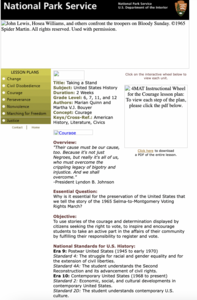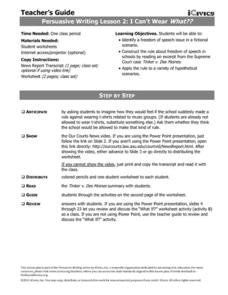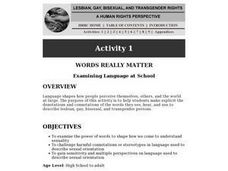Stanford University
Ruby Bridges
A two-part lesson features Civil Rights hero, Ruby Bridges. Part one focuses on the heroic actions of Ruby Bridges then challenges scholars to complete a Venn diagram in order to compare themselves to her. Part two begins with a...
Mississippi Department of Archives and History
Protesting Violence without Violence
The ultimate legacy of Emmett Till's violent death is its role in the non-violent roots of the Civil Rights Movement. A instructional activity compares contemporaneous articles with the lyrics of Bob Dylan's "The Death of Emmett Till"...
Literacy Design Collaborative
Exploring Character Development in The Watsons Go to Birmingham - 1963
How did the Civil Rights Movement affect young people in the United States? Scholars read Christopher Paul Curtis' novel, The Watsons go to Birmingham - 1963. Next, they write compare and contrast essays showing how the main characters...
Stanford University
Japanese American Incarceration
Using documents, such as reports from government sources and civil rights activists, budding historians explore the justification for forcing hundreds of thousands of Japanese-Americans to leave their lives and re-evaluate that tragic...
National Woman's History Museum
Songs of Protest: Seneca Falls to Vietnam
Long before the songs of the 1960's Peace Movement, long before the songs of the Civil Rights Movement, and even before the songs of the Abolition Movement, were the songs of the Suffrage Movement. To understand the power of protest...
PBS
Keep Your Head Up | Black America Since MLK: And Still I Rise
Change may be slow in coming, but things do change. Oprah Winfrey and Black Entertainment Television CEO, Robert L. Johnson, discuss the opportunities available to them due to the efforts of Dr. Martin Luther King, Jr. and other civil...
Learning for Justice
Mary McLeod Bethune
Young historians conduct a close reading of the text of an interview with Mary McLeod Bethune, the daughter of former slaves who taught herself to read, grew up to establish schools for other Black women, and went on to become an advisor...
Curated OER
Homophobia: What is It? What Can We Do About It?
A two-part lesson focuses on the sensitive issues of homophobia, discrimination, sexuality, and gender. Middle schoolers discuss individual and institutional discrimination, personal rights, homosexuality, and bullying.
Curated OER
Who Knows? Your Privacy in the Information Age
Teach young adults how to become advocates for their privacy in the modern information age. In a series of five lessons, learners explore their beliefs and opinions about privacy vs. the actual laws regarding who has the right to access...
TCI
Ain't I a Woman?
Learners discover the impact of women on civil rights in United States history by analyzing primary source clues to identify influential female figures.
Curated OER
Researching Equality and Justice
Choosing from a list, researchers investigate topics that range from the women in the American Civil Rights movement to the quest for equal rights in Iraq and Afghanistan. Although the plan is not detailed, a link to a PBS site that...
Curated OER
Before Rosa Parks: Ida B. Wells
The contributions of Ida B. Wells to the Civil Rights Movement are the focus of this social studies instructional activity. Middle schoolers read a handout regarding Wells, discuss the handout, and write about non-conformist behavior.
Curated OER
Evolving Views about Minority Rights in the United States
Tenth graders compare and contrast majority and minority outlooks on issues. In this social justice lesson, 10th graders research majority and minority values regarding the Salem Witch Trials, Plessy v. Ferguson, the McCarthy hearings,...
Curated OER
Who’s Got Rights? An Introduction to Human Rights and Human Rights Defenders
High schoolers explore human rights issues. In this social justice instructional activity, students examine human rights as they read segments of the "Universal Declaration of Human Rights," discuss photographs with human rights...
Curated OER
Taking a Stand - 1965 Selma-to-Montgomery Voting Rights March
Young scholars examine the 1965 Selma-to-Montgomery Voting Rights March. They view pictures reflecting their perceptions of their most important rights as citizens, write journal responses, create collages illustrating courage, and read...
Curated OER
Equal Rights
Students experience what it would be like for any one group to make the laws that all people are to follow.
University of California
The Civil War: Lincoln’s Speeches
Abraham Lincoln is responsible for uniting the states during the most tumultuous periods in American history, and for his elegant oratory that kept the Union believing in its cause. Young histoians analyze various speeches by America's...
Middle Tennessee State University
Fights, Freedom, and Fraud: Voting Rights in the Reconstruction Era
As part of a study of post Civil War era, young historians investigate the changes in voting rights during the Reconstruction Era (1863-1876), the fraud involved in the Hayes-Tilden presidential election of 1876, and efforts by Pap...
Curated OER
African Americans in the Civil War
Students examine the contributions of African American soldiers during the Civil War. In pairs, they complete Civil War timeline worksheets. They use character cards to assume the identities of African Americans and determine whether or...
Curated OER
African-American Soldiers After World War I: Had Race Relations Changed?
Students utilize an online database to conduct research and analyze the conditions for African-Americans before and after World War I. They consider the role of the 92nd and 93rd divisions in affecting social change.
Middle Tennessee State University
A House Divided: The Civil War Home Front in Tennessee
To broaden their understanding of both the short term and long terms effects of the Civil War, class groups examine primary source materials and then assume the role of a family member and draft a letter to a soldier describing life at...
iCivics
I Can’t Wear What?
Can schools ban t-shirts picturing musical groups or bands? Your young citizens will find out with this resource, which includes a summary of a United States Supreme Court case from the 1960s about a similar dispute over students wearing...
Curated OER
Words Really Matter: Examining Language at School
Help your young scholars gain sensitivity and become aware of the implications of the words they see, hear, and use about lesbian, gay, bisexual, and transgender people. After making lists of words or phrases they hear or use in school...
Curated OER
Landmarks of the Underground Railroad
Students explore Civil Rights by reading several books in class. In this Underground Railroad lesson plan, students discuss The Story of Henry Box Brown and identify the location and functionality of the Underground Railroad. Students...
Other popular searches
- Civil Rights Movement
- Civil Rights Act
- Civil Rights Harriet Tubman
- Civil Rights Music
- Civil Rights Movement Music
- Civil Rights Act 1964
- Civil Rights Era
- Civil Rights Act of 1964
- Civil Rights Legislation
- Children's Civil Rights
- U.s. Civil Rights
- American Civil Rights Movement

























